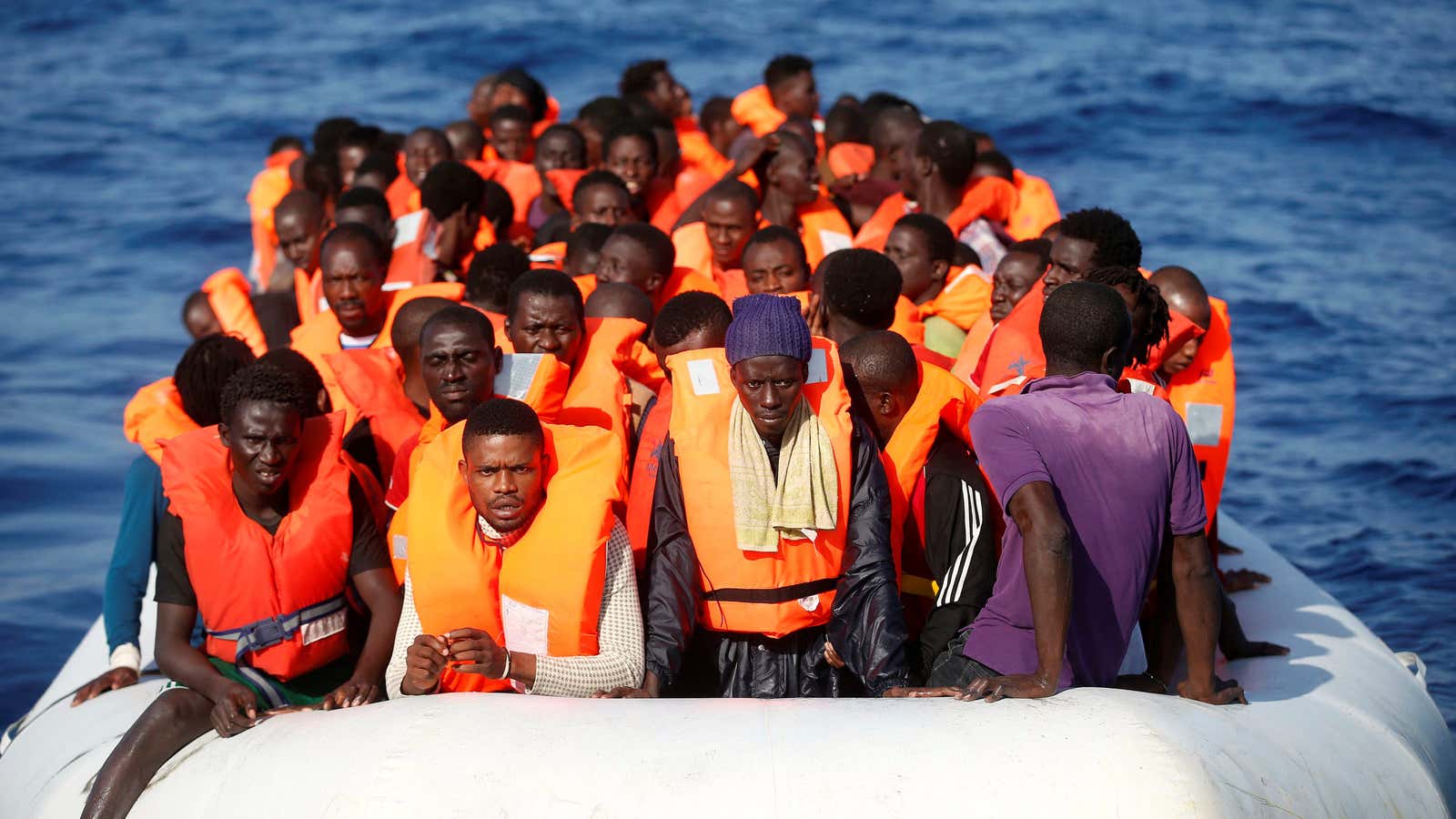The European far right have found a new front for fighting immigration: rescue missions at sea.
A group of far-right activists have banded together under the name Defend Europe, with the mission of stalking humanitarian vessels to document their rescues and “intervene” when necessary.
The group says that humanitarian missions like Save the Children and Doctors Without Borders, which are working to aid refugees whose lives are threatened while traversing the Mediterranean, are doing more harm than good. These groups enable refugees by providing “a taxi service from Libya to Sicily or to Europe,” according to Defend Europe spokesman Lorenzo Fiato.
Fiato says the group belongs to the “identitarian” movement, a conservative youth movement that opposes mass migration to Europe and wants to preserve European culture. The group launched in France in 2002, in line with the European New Right and the Alt Right in the US.
Fighting the humanitarians
To fight immigration, integration, and multiculturalism, the group is establishing a maritime presence to “break the narrative of the NGOs saving lives at sea [sic],” Fiato explains. The identitarian movement has mimicked tactics of leftist groups such as Greenpeace, creating public scenes by hanging banners in public places (one at the Brandenburg Gate in Berlin read “secure borders, secure future”), blocking roads (to the Calais migrant camp in France), and occupying mosques (in the Netherlands and France).
Italy is the main destination for migrants trying to reach Europe by sea, due to in part to its proximity to Libya. As European governments have closed off land borders to Europe, more migrants have been forced to take dangerous sea journeys to Europe.
Defend Europe formed after a group of identitarian activists sailed on a small boat in Sicily’s Catania harbor to protest a humanitarian vessel’s plan to rescue a group of migrants. The far-right group, which hoisted a yellow flag with the mark of the identitarian movement, tried the stop the humanitarian ship by throwing flares into the air and sea. A video by Defend Europe of the event ends with the message that the stunt was “just the beginning.”
The latest endeavor in the Mediterranean will be the group’s biggest stunt yet. This month, Defend Europe crowd-funded more than $100,000 on WeSearchr to purchase a 40-meter (130-foot) ship for its sea campaign. The ship, named “C-star”, sets sail on Sunday (July 18) from Djibouti (where the ship was docked) to pick up its crew in Catania, Italy. From there it will rove the seas in search of refugee activity.
There will be 12 activists on board from Italy, Austria, Germany, and France, according to Fiato, some who are full-time students such as himself (Fiato studies political science in Milan). Members of the press will also be on board, including right-wing British columnist Katie Hopkins, and a professional crew, who are sympathetic to Defend Europe’s aims.
Fiato explains that Defend Europe will help “the Libyan coastguard finding the human traffickers ships before the NGOs do [sic].” The group says it will help the Libyan coastguard arrest the human traffickers and return the migrants to Libya. Once the migrants are returned, Defend Europe will then destroy the dingy boats migrants are often forced into to ensure they can’t be used again.
Fiato was keen to stress that Defend Europe was not “going to interrupt any kind of rescue mission,” but anti-racist groups argue that was its original mission. A spokesperson for Hope Not Hate, an anti-racist UK advocacy group, points out that “originally on their funding material part of their messaging was about blocking ships.” In one video, one of the leaders of Defend Europe and identitarianism, Martin Sellner, said in May that the group would “block those ships from going to the Libyan coast.”
Defend Europe will, according to Fiato, help to rescue migrants if it receives an SOS request and is the only ship around. The ship doesn’t have a crew of doctors, he says, but will try to provide migrants with support, call the Libyan coastguard to step in, and assist in returning migrants to Libya. Fiato adds that “if the Libyan coastguards do not come, then we will take them on board and we will bring them to Tripoli.”
The fallout
Refugee advocates say Defend Europe’s actions will only worsen what has become a particularly deadly year for migrants. More than 2,000 people have died in 2017 trying to get to Europe through the Mediterranean, according to Amnesty International. The human rights group blames EU governments for the death toll, criticizing the decision to shift the EU’s focus from providing search-and-rescue vessels to supporting the Libyan coastguard to intercept and return migrants to Libya.
The Libyan coastguard, which receive vast sums from the EU, has been accused of widespread human rights abuses (paywall) regarding refugees. A rescue by the Libyan coastguard can lead to more abuse and incarceration in Libya, where an armed conflict and humanitarian crisis have raged on since 2014. The country currently has three rival authorities competing for legitimacy and territorial control.
Italy, the country most affected by Europe’s migrant crisis, has asked for help in coping with the influx of migrants—the number increased by nearly 20% in first six months of this year, compared to the same period a year ago. The country has threatened to close its ports, but other European countries have yet to step in to relocate migrants.
A new EU code of conduct for humanitarian vessels is pending, which would ban NGOs from entering Libyan territorial waters and communicating with smugglers by phone. NGOs would also have to allow police officers on board and wouldn’t be allowed to transfer refugees to other ships, but instead return immediately to port.
Defend Europe supports the draft rules. Human rights group fiercely oppose them, arguing they will only put migrants in more danger.
